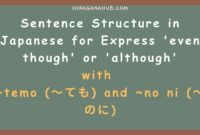If you want to learn Japanese online free, understanding essential grammar structures is key. One useful pattern is ~hou ga ii (~方がいい), which is used to give advice or suggestions. In this lesson, we’ll focus on how to use it properly.
What Does ~Hou Ga II Mean?
Meaning: “It’s better to…” / “You should…”
Writing: Can be written in kanji (方がいい) or hiragana (ほうがいい).
Usage: This pattern expresses advice or recommendations.
Note: Since it’s direct advice, it’s typically used by someone of equal or higher status.
Variation: Ii can be replaced with yoi, making it ~hou ga yoi.
How to Use ~Hou ga ii
There are two ways to structure this grammar:
Past Tense Verb (~Ta Hou ga ii)
Formula: Verb (past tense, ta-form) + ほうがいい
Examples:
病院に行った方がいい。
Byouin ni itta hou ga ii.
“You should go to the hospital.”
新しいのを買った方がいい。
Atarashii no o katta hou ga ii.
“It’s better to buy a new one.”
家にいた方がいい。
Ie ni ita hou ga ii.
“You should stay at home.”
将来のために勉強した方がよい。
Shourai no tame ni benkyou shita hou ga yoi.
“You should study for your future.”
Negative Form (~Nai Hou ga ii)
Formula: Verb (negative form, nai-form) + ほうがいい
Examples:
部屋から出ないほうがいい。
Heya kara denai hou ga ii.
“You shouldn’t leave the room.”
ここで煙草を吸わない方がいい。
Koko de tabako o suwanai hou ga ii.
“You shouldn’t smoke here.”
寝る前には食べない方がいいですよ。
Neru mae ni wa tabenai hou ga ii desu yo.
“It’s better not to eat before sleeping.”
寒いから、冬の時、日本へ行かない方がいい。
Samui kara, fuyu no toki, Nihon e ikanai hou ga ii.
“Since it’s cold, you shouldn’t go to Japan in winter.”
Final Tips for Using ~Hou ga ii
Use this pattern when giving strong suggestions.
Be mindful of politeness—best used with friends, family, or juniors.
For more formal advice, consider softer alternatives like ~tara dou desu ka? (How about…?).
Now that you’ve learned this essential grammar, try making your own sentences! If you want to learn Japanese online free, keep practicing with real-life examples.
がんばってください!(Good luck!)



